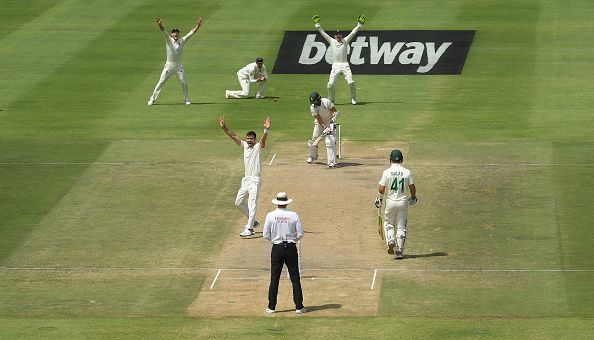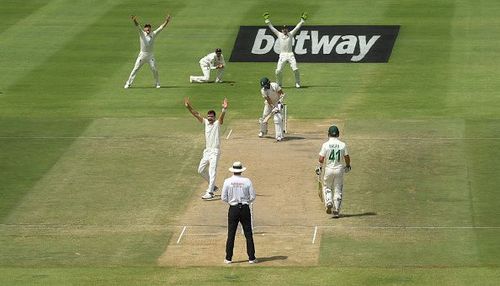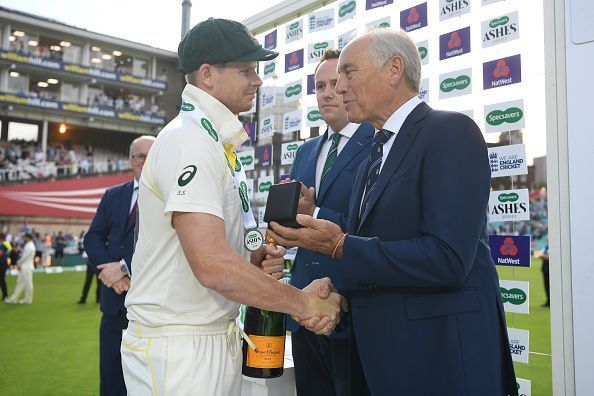
Did the Newlands Test's fifth day impact the four-day discussion?

Some cricket fans in England saw the vital victory over South Africa in the final hour of play as a halt to the idea of the four-day Test, an initiative that had been getting significant traction since it was revealed that the ICC were likely to formally consider the change in 2020.
What took place on that fifth day in Newlands was some of the most dogged and determined Test match cricket you would hope to see. South Africa mounted a resistance after James Anderson trapped nightwatchman Keshav Maharaj LBW early on in the day's play. This dogged resistance was ended, however, by what can only be described as a monumental lapse in concentration by Faf Du Plessis, whom picked out Joe Denly from an innocuous Dom Bess delivery, to give him his second wicket of the match.
Pieter Malan, who played with great discipline, went 10 overs later to a rising delivery from Sam Curran. The opener had played superbly on his debut for 84 runs. Quinton De Kock and Rassie van der Dusen steadied the ship somewhat, with De Kock being the aggressor of the two, whilst the latter seemed content to soak up as many balls as possible. The partnership was ended when De Kock heaved a drag down from Denly into the hands of the young Zak Crawley. Van Der Dussen fell shortly after, getting caught in a leg side trap that England had cleverly worked.
Follow Sportskeeda for more Cricket news.
What remained on that final day was nothing more than sensational from the irrepressible Ben Stokes, whose two wickets in two balls, claiming Dwaine Pretorius and then Anrich Nortje, seemed to finally seal the game in England's favour. It was fitting then, that with 8.2 overs remaining, Stokes was able to find Vernon Philander's edge from a ripping delivery that rose sharply off the Cape Town deck, thus ending a classic Test Match and an exciting day's play.
Whether the match itself had any bearing on the proposed change, however, is questionable. Indeed, it could be said that the messages coming out of the ECB and it's employees before and after the match were markedly different. A spokesperson for the ECB stated that a move to the four-day format could ease some of the scheduling burdens placed on players prior to the Newlands game.
Joe Root, the England Test captain, suggested that trials for the four-day game should take place. Yet, immediately after the victory the tune seemed to change. Stokes joked that four-day matches should be called "easy cricket" while Root seemed to imply that he would "get in trouble" if he allowed his true feelings on the matter to be heard. Even Ashley Giles, England Cricket's managing director, stated that a move would mean missing out on matches like this.

The new English sentiment after their dramatic victory in Cape Town, however, had simply changed to mirror many throughout the rest of the world. Sachin Tendulkar had already claimed that Test match cricket "should not be tinkered with" with Virat Kohli echoing those thoughts. Nathan Lyon, with 390 Test wickets to his name, claimed he was "totally against the idea" and that he hoped the ICC were not even considering the change. It seemed like the Newlands Test simply reinforced that five-day cricket was the superior format, rather than having changed the narrative.
However, former and current players will not be where this argument is won or lost. The true power lies behind the scenes, particularly with broadcasters and cricket boards. The CSA released a statement claiming it was their policy to support the four-day Test and it is no surprise that a financially struggling board would back this idea, as often the fifth day of a Test bleeds money rather than making it.
The broadcasters also echo this viewpoint, as a shorter time frame would mean less costs. Rajesh Kaul, the chief risks officer at Sony Pictures Networks India, stated that "they will definitely have to tweak it (Test cricket) to some extent to ensure that the interest levels in Test cricket become higher. Because, overall, the interest in Test cricket is going down".
What broadcasters must consider then is the current financial viability of the five-day test. Colin Graves, the current ECB chairman, gave a stark warning to any ideas of putting Test matches on free-to-air television as it costs the broadcasters roughly £1 million just to produce the coverage for the event. Herein lies the problem with the five-day Test for many countries. The broadcasters want to reduce their costs and the simplest way to do that is to reduce the number of days in which they have to produce and broadcast Test cricket.

As Graves himself stated, "you will struggle to make revenue from a test match" (if the ground is not full, which is almost always the case in countries outside of Australia and England). Thus we see why many of these countries will have to bow down to the pressure placed on them by broadcasters.
To see just how much power the broadcasters have and how little power Test cricket has in the world of finances, you need not look further than the broadcasting rights of the BCCI. Star India recently paid $2.55 billion (US) solely for the rights of the Indian Premier league, where-as for the rights to all International matches (including Tests) was priced at just $944 million (US). The broadcasters know that the easiest way to make a return on their Test investment is to reduce costs whilst still maintaining the product.
In this context then, we see where the four-day discussion will really be had—in the boardrooms of broadcasters and cricket boards around the world as they look to solve the problem of a lack of profitability in the longest format of the game. Whether the answer is found in new broadcast deals, or the cutting of a day remains to be seen.
However, one thing that is certain is that players may become increasingly pressured to accept any changes made, especially in countries where Test cricket hemorrhages money, rather than makes it.
The Newlands Test provided a timely reminder of the superb drama that can be had on the final day of a five-day Test match, but inevitably it may be a hollow victory for those in favour of the five-day game. Du Plessis claimed he was a "fan of test cricket going five days" and that he is "still a purist of the game". This sentiment may be one that is echoed around the world, the purists fighting the changes that may eventually save the game as we know it. The Newlands Test should be enjoyed for what it was, a classic game of grit and skill, but in reality it will have very little impact on the future of Test match cricket.